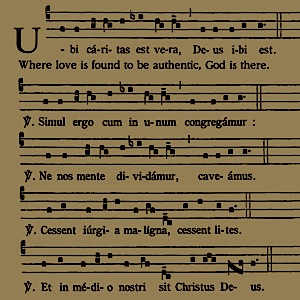
 N THE FEAST OF SAINT CECILIA in 2003, Pope Saint John Paul II gave the Chirograph for the Centenary of Tra le sollecitudini of Pope Saint Pius X. As Gregorian Chant was arguably “dead” during much of his pontificate, Pope Saint John Paul II’s strong words on Gregorian Chant, are therefore even more notable:
N THE FEAST OF SAINT CECILIA in 2003, Pope Saint John Paul II gave the Chirograph for the Centenary of Tra le sollecitudini of Pope Saint Pius X. As Gregorian Chant was arguably “dead” during much of his pontificate, Pope Saint John Paul II’s strong words on Gregorian Chant, are therefore even more notable:
12. With regard to compositions of liturgical music, I make my own the “general rule” that St Pius X formulated in these words: “The more closely a composition for church approaches in its movement, inspiration and savour the Gregorian melodic form, the more sacred and liturgical it becomes; and the more out of harmony it is with that supreme model, the less worthy it is of the temple”. It is not, of course, a question of imitating Gregorian chant but rather of ensuring that new compositions are imbued with the same spirit that inspired and little by little came to shape it.
He immediately follows with words extremely humbling for any composer:
“Only an artist who is profoundly steeped in the sensus Ecclesiae can attempt to perceive and express in melody the truth of the Mystery that is celebrated in the Liturgy.”
Other notable sections:
3. “…I have also stressed the need to ‘purify worship from ugliness of style, from distasteful forms of expression, from uninspired musical texts which are not worthy of the great act that is being celebrated”, to guarantee dignity and excellence to liturgical compositions.” (emphasis added)
4. “In continuity with the teachings of St Pius X and the Second Vatican Council, it is necessary first of all to emphasize that music destined for sacred rites must have holiness as its reference point: indeed, ‘sacred music increases in holiness to the degree that it is intimately linked with liturgical action…’” (emphasis added)

IN COMPOSING THE “MASS IN HONOR OF POPE SAINT JOHN PAUL II”, I pray that I lived up to some of the his words. If not, I will strive further!
Recently, I was asked to provide a Unison and Organist Edition of the mass. It is available below. (Descants are still included!) Furthermore, this mass is published with the approval for liturgical use by the Committee on Divine Worship, United States Conference of Catholic Bishops.
DOWNLOAD Unison/Organist Edition:
PDF • Mass in Honor of Pope Saint John Paul II (for Schola, Organ)
DOWNLOAD Complete Score (2.3 MG):
PDF • Mass in Honor of Pope Saint John Paul II (for Schola, Organ, SATB)
• SATB Recordings by the St. Cecilia Choir, Boston, MA, with the 1999 Smith & Gilbert Organ:
YouTube: Penitential Act C | Kyrie
YouTube: Gloria
YouTube: Sanctus
YouTube: Memorial Acclamation A
YouTube: Memorial Acclamation B
YouTube: Memorial Acclamation C
YouTube: Doxology, Amen
YouTube: Agnus Dei
